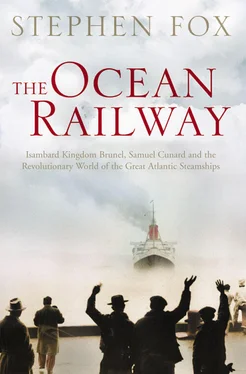The man himself remained a mute mystery. Nobody in Boston knew Sam Cunard well; he had a few business associates there, nothing more. He didn’t talk much, and he had accepted few of those eighteen hundred dinner invitations. He was said to be an Englishman, or perhaps a Canadian, or maybe of American parentage. The city’s keenly focused interest in him derived, in part, from simple unsatisfied curiosity: Who was this man? A few sceptics remained doggedly unimpressed. ‘ Mr. Cunard, a substantial, sensible Englishman, and not an Emperor, sits enthroned in state in the saloon of the Britannia,’ one doubter wrote to a local paper. ‘A proper self-respect will not warrant us in canonizing him.’ But this was only a peevish dissent, drowned out by a tidal wave of adulation and applause.
The ‘ Cunard Festival’ to honour him took place at the Maverick House hotel, near the Cunard wharf in East Boston. Planned while the Britannia was still at sea, the event was staged on a scale and opulence seldom previously seen in Boston. A temporary pavilion and awning stretched 200 feet along the front of the hotel. Pennants and flags of all nations snapped in the breeze. An elliptical arch spread across the Maverick’s second storey, resting on two abutments. One of these bore the British coat of arms and the name Watt, honouring the Scottish inventor who had improved the steam engine. The other showed the American arms and the name Fulton, the Hudson River steamboat pioneer. At the centre of the arch, joining the two ancient national foes in symbol and reality, was the name Cunard in large gold letters – a premature tribute, mustered in brave hope and confidence, to the new but unproven steamship service.
On a raised platform sat the presiding officer, Josiah Quincy Jr, president of Harvard College and former mayor of Boston. To his right satSamuel Cunard, Senator Daniel Webster (the leader of Massachusetts Whigs), and other important men. To Quincy’s left sat Captain Woodruff of the Britannia, George Bancroft (the Democratic boss of Massachusetts), and others of distinction. Overlooking them, outside the pavilion itself, on the hotel’s porch and balconies and in upstairs windows, were hundreds of women dressed in their summer finery: the first time in memory that women had been invited to attend a public dinner in Boston (though not, actually, to be fed).
After a fancy meal, wines and mounds of ice cream, the extended speeches and toasts sounded the framing issues of the day. Daniel Webster, a noted orator, spoke about the rippling impacts of steam power on civilization, commerce, war and politics. George Bancroft welcomed the Cunard Line as ‘an omen of peace’, sure to usher in a new era of friendly relations, and offered a hopeful toast: ‘Old England – She renounces the ambition of ruling the seas, and effects the nobler purpose of connecting continents.’ Cigars were passed around (but quickly put away in deference to the unfamiliar feminine presence). Someone offered a song in tribute to the new line:
How timid and slow, but a few years ago,
The world hobbled on in its motion.
Old Europe seem’d far as the fixed Northern star,
On the boundless expanse of the ocean;
But tho’ it was hard–at the word of Cunard
Britannia herself is a rover.
Old England a while, that fast anchor’d Isle,
By steam is now here–half seas over.
Josiah Quincy introduced the man of the hour. ‘The enlightened foresight of Mr. Cunard, a citizen of Nova Scotia,’ he declared, ‘aided by the liberality of the British crown, has established a line of steam packets on a permanent basis.’ By advancing the interests of his own country, Cunard had incidentally conferred coveted gifts on America, and – Quincy hoped – Boston might now recover its old prosperity. The band impartially played both ‘Yankee Doodle’ and ‘God Save the Queen’. The climactic moment had arrived.
In this speechmaking age, when events happened live, in oral discourse, any distinguished man was expected to have an easy knack for facing and holding an audience. Grand oratory was a routine tool of persuasion and power. The crowd clapped and cheered hard for Cunard,waiting in curiosity and expectation for him to speak, watching him. He was a handsome man, apparently of middle age, a bit less than average height. He had a large, round head, balding at the crown, with a fringe of grey hair turning white, and closely trimmed muttonchop whiskers in the style of the day. He looked healthy and well knit, compact and tightly wound, and quite decisive around the mouth and eyes.
Cunardstood up and started speaking, inaudibly, before the last applause subsided. The newspaper reporters seated nearby could not hear him. He said only a few more words, and then – to the surprise of everyone – sat down. Josiah Quincy, rushing into the dead air, sprang up to say that Mr Cunard had explained he was unaccustomed to public speaking and thus would make no speech, but he felt quite grateful to be so honoured, given that the real credit for the new steamship line belonged to the British government. And that was that. His odd performance concluded, the hero remained triumphantly unknown in Boston.
A few days later, in much more modest circumstances, another dinnerwas held for men of the Britannia.Only Captain Woodruff and a few officers had been invited to the Cunard Festival; so a group of local machinists and mechanics, described as ‘respectable’ by one newspaper, threw a small celebration for the ship’s chief engineer, Peter Kenneth, and his mates at the Stackpole House, on Milk Street near the waterfront. The innkeeper, James Ryan, provided entertainment. (No Boston Irishmen like Ryan had taken visible part in the Cunard Festival.) All the guests on hand told a story or sang a song or ventured a sentiment. They raised their own toasts to the owners and hands of the Britannia (‘Her successful voyage has proved that their capital and labor were most happily united’) and, in engineer’s vernacular, to the mother country (‘She sometimes gets the steam up a little too high, but she finds an escape pipe when she visits her daughter’). The engine men, both ashore and from below decks, added their voices to the general spirit of determined reconciliation.
After two weeks, Cunard and his ship left Boston for Halifax and Liverpool on the afternoon of I August, well loaded with eighty passengers. Spectators around the harbour were again frustrated; having arrived in night-time darkness, the Britannia departed in a daytime thick fog that left her visible only from close at hand. She picked her way slowly along the Maine coast, taking three days to Halifax, shrouded in fog the whole way. The North Atlantic was again extending its typical welcome.
‘ The Atlantic to Americais the worst navigation in the world,’ Sam Cunard pointed out years later, from a prudent and well-earned distance.‘The westerly winds prevail very much, and you have ice and fog to contend with.’ Despite these daunting natural obstacles, however, he had launched his Atlantic steamship line and made it run through endless crises and troubles. ‘ I originatedthis service at a great risk,’ he claimed in pardonable pride, dropping the humble pose of the Cunard Festival in Boston, ‘and at a time when no other party could be found to undertake it.’ And the result? ‘ A beautifulline of communication between the eastern and western world.’
It was all there from the start. The major themes of transatlantic steamship history, to be echoed repeatedly over the next hundred years, first appeared in the summer of 1840 during the Britannia’s maiden round trip, Liverpool to Boston and back.
The daunting North Atlantic Ocean passage between Britain and America.
Читать дальше












